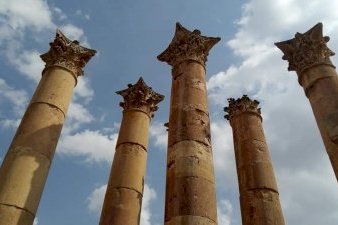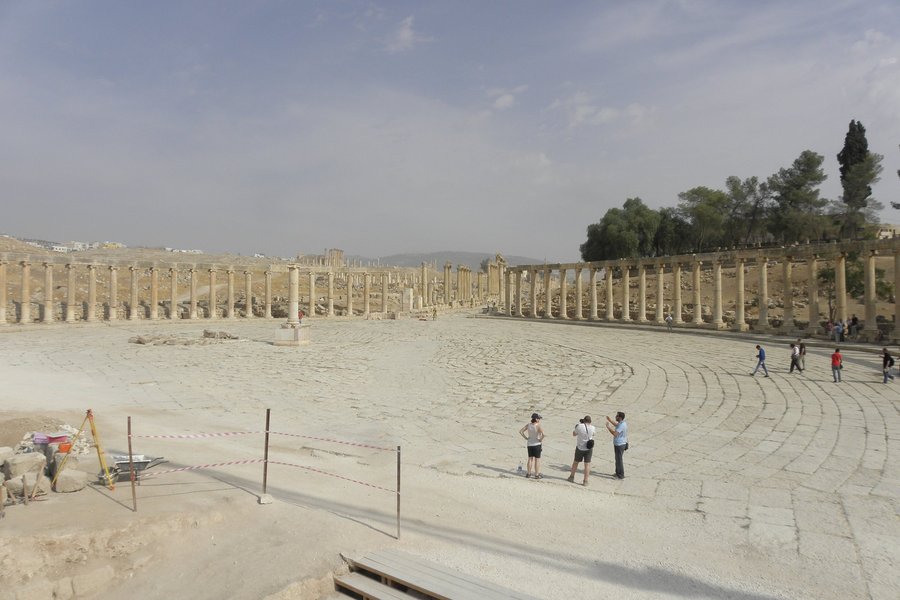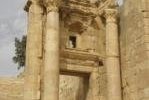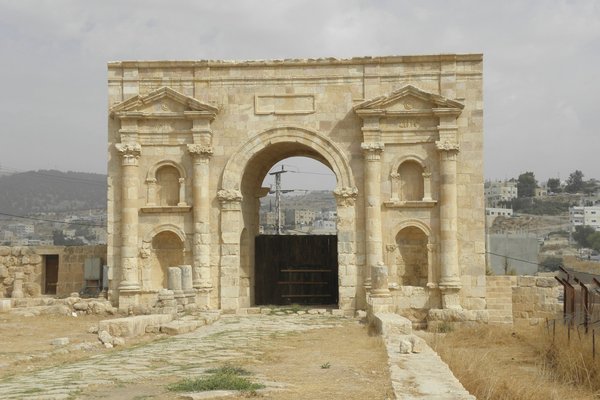Jordan
Jerash Archaeological City
Site Info
Official Information
- Full Name
- Jerash Archaeological City (Ancient Meeting Place of East and West) (ID: 1856)
- Country
- Jordan
- Status
-
On tentative list 2004
Site history
History of Jerash Archaeological City
- 2004: Added to Tentative List
- Added to tentative list
- 1995: Referred
- Bureau - Concerns re buffer zone and impact of Festival need to be addressed
- 1986: Deferred
- .
- 1985: Deferred
- Needs Boundaries and Management Plan
- Type
- Cultural
- Criteria
Links
- UNESCO
- whc.unesco.org
All Links
UNESCO.org
- whc.unesco.org — whc.unesco.org
News Article
- Nov. 6, 2019 theguardian.com — Foreign tourists among eight stabbed in Jerash
- May 15, 2016 ansamed.info — Aphrodite statue discovered in Jerash
Community Information
- Community Category
- Archaeological site: Ancient Rome
Travel Information
Recent Connections
News
- theguardian.com 11/06/2019
- Foreign tourists among eight stabb…
- ansamed.info 05/15/2016
- Aphrodite statue discovered in Jer…
Recent Visitors
Visitors of Jerash Archaeological City
- Alberto Rodriguez Gutierrez
- Alexander Lehmann
- Alexander Parsons
- Ali Zingstra
- Ammon Watkins
- Argo
- awestix
- bergecn
- Bin
- Boj
- Chantal den Haan
- Christravelblog
- Cluckily
- Clyde
- Corinne Vail
- CugelVance
- David Berlanda
- Dirk-pieter
- Elena Y
- Els Slots
- Eric Lurio
- Erik Jelinek
- Evgenii
- Feldhase
- Femke Roos
- Francky D'Hoop
- Frédéric M
- FS
- GabLabCebu
- George Gdanski
- Gilles
- Grzegorz Andruszkiewicz
- Hadrianus
- Hammeel
- HaraldOest
- Harry Mitsidis
- Hdhuntphotography
- henryjiao18
- Ingrid
- Jacob Otten
- Jakubmarin
- Jana and Matt
- Jan Zimmermann
- Jarek Pokrzywnicki
- Jay T
- Jean Lecaillon
- Jeanne OGrady
- Jeffrey Chai
- J_neveryes
- John Smaranda
- jonathanfr
- Jon Opol
- Jonoprout
- Juha Sjoeblom
- KentishTownRocks
- Kevin McFarland
- Lara Adler
- Leonie Geurts
- Luboang
- Ludvan
- Maciej Gil
- marc Rouserez
- Martin
- Martina Rúčková
- Matthewsharris
- MaxHeAnouBen
- Michael Turtle
- Mihai Dascalu
- Milan Jirasek
- Monica Tasciotti
- MoPython
- PabloNorte
- Patrik
- Paul Schofield
- Peter Lööv
- Philipp Peterer
- Pieter Dijkshoorn
- Piotr Wasil
- pressdm
- Priyaranjan Mohapatra
- Ralf Regele
- Ralf Rotheimer
- Randi Thomsen
- ReallyDeepThoughts
- Riccardo Quaranta
- Rick Ohm
- RobRos
- Roger Ourset
- Roman Raab
- Sandra!
- Sclowitz
- Sehnsuchtsbummler
- Sergio Arjona
- Shannon O'Donnell
- Solivagant
- Stanislaw Warwas
- Svein Elias
- Szabolcs Mosonyi
- Szucs Tamas
- Tarquinio_Superbo
- Thomas Buechler
- Thomas van der Walt
- Tim Allen
- Timothy C Easton
- tony0001
- triath
- Truls Brekke
- V&M
- Wojciech Fedoruk
Community Reviews
Show full reviews
In April 2018, my trip to the Holy Land brought me to many T-list sites, but only one was truly a highlight for me. I still don't understand how this place isn't already a WHS as it's one of the finest Roman cities left in the world today. Of course, I'm talking about Jerash.
Jerash is an outstanding site in the Middle East. From the entrance to the North Theatre, it's around 2 kilometers' walk. And that's not the true end of the Roman city yet. The modern city of Jerash surrounds the archaeological complex on all sides, and it's still normal for its inhabitants to find artifacts and remains under their houses. The archaeological complex itself, though, is big enough and fascinating enough that I simply forgot about the modern city around. Either way, it doesn't take much imagination to bring back the Roman times when the ruins of Jerash were a center of trade and culture.
From the parking lot, I passed through a slightly annoying little tourist bazaar befire finally coming to the first landmark of Jerash: Hadrian's Arch. It towered high over all the visitors it welcomed to the great city. Its design is impressively intricate, especially the windows and the pediment. Going through the arch, I went on to the Hippodrome, which still has its chambers around it well-preserved. Across the trail is a Byzantine church with its mosaic floor still intact. I continue to the South Gate, the gate to what would …
Keep reading 0 comments
In October 2018, I made a day trip from Amman to Jerash, one of the largest and most well preserved Roman ruins outside Rome, and the second most inexcusable omission by UNESCO from its list of World Heritage Sites (after the temples of Bagan).
Keep reading 0 comments
I visited this great site in April 2009. I too cannot believe such a grand Roman site has been left out of the list. It is one of the most complete Roman cities in the world and more funds are needed to continue the archaeological work to continue uncovering the rest of the remains which are still buried. The chariot race renactment was very interesting and was a great ending to my visit. I'd suggest you hire a local guide once you arrive there. Ours was very knowledgable and gave us an in-depth overview of the place and its importance. I hope that this site becomes a WHS some day because it really deserves it.
Keep reading 0 comments
After Petra, Jerash must be the next most popular tourist destination in Jordan. I visited it on a day trip from Madaba, using my rental car to navigate through the busy and seemingly neverending suburbs of Amman.
It's a bit of a mystery why the former Roman city of Jerash (Gerasa) has been left out of the World Heritage List in the early stages. It surely is one of the most complete remains of a Roman (colonial) city that I have seen. And believe me - I have seen many!
Features that stand out here are the oval Forum, the 800m long and very intact (Pompeii-like) Cardo Maximus, and the lovely intimate North Theatre. Hundreds of pillars adorn the Forum, the streets and the temples . They have been put upright during the restorations I guess, and sometimes even pieced together again. The quality and completeness of the constructions and objects is so high that it is sometimes too good to be true. Especially both theatres have been restored almost completely to perfection - I would not be amazed that ICOMOS had something to say about that.
It's a very fine site to visit for a couple of hours, and it would be a worthy WHS. Entrance costs 8 JD (8,80 EUR). The site receives lots of visitors each day, including tour groups from all over the world.
Keep reading 0 comments
This for sure will be once listed on the main WHS list. One of the most remarkable ancient places can be compared only with Palmyra or Baalbek. You can see complete layout of ancient big town with two thatres, palaces, temples, agoras, stadium, streets, arches, houses and town walls. It is advised to spare full day to see all sights there, in sunny days take plenty of water with you but there is a small restaurant on the spot as well as other amenities.
Keep reading 0 comments
